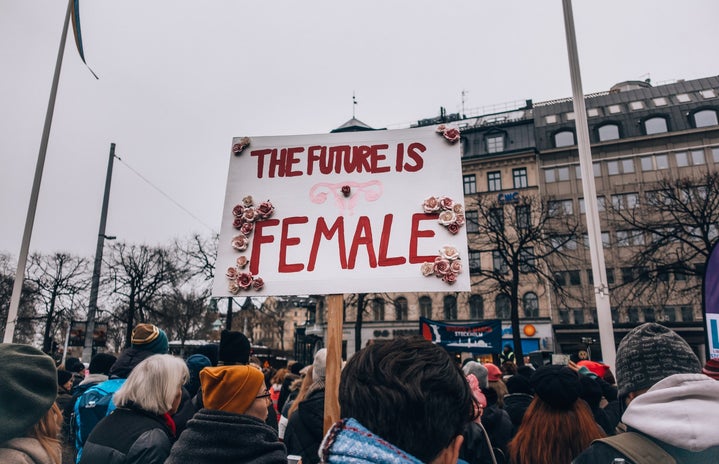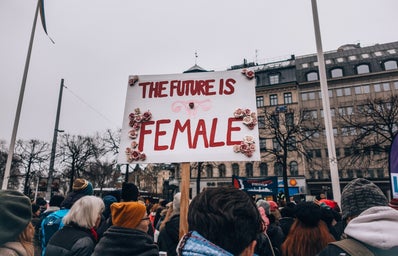Reclaim the Night held its annual women’s march in Nottingham last Saturday night. Whilst I was so appreciative to have participated in the event, I admit that my prior knowledge of the protest lacked depth regarding its tradition and purpose. As I write this, I wish to report my experience and furthermore share what I’ve learned in hopes of educating everyone, as I believe that the movement is vital in asserting that violence against women should not be tolerated.
WHAT HAPPENED?
On the night of Saturday 22nd October, women of Nottingham marched through the streets in unity to protest gender-based abuse, ultimately with the intent of subverting violence against women. People gathered at Sneinton Market from 6:30pm before beginning their march through the city centre chanting, singing, drumming and dancing. Local Iranian women such as Rose Khoshirat, the founder of the newly formed organisation Freedom for Iran, proudly spoke about the cause and its value towards bringing about change. Nadia Whittome, Member of Parliament for Nottingham East, concluded the event by expressing her solidarity amongst all women, especially recognising the repression and abuse that trans women, migrant women, sex workers, and survivors of violence suffer from.
WHY DID THE WOMEN ON NOTTINGHAM MARCH?
Reclaim the Night Nottingham’s Instagram page (@rtnnottingham) sets out the many reasons why the women of Nottingham take to its streets every year:
- We march because everyone should have the right to feel safe.
- We march to demand an end to assault, rape and all forms of men’s violence and harassment against women and girls.
- We march to demand an end to the victim-blaming of women who experience sexual assault, rape, violence and harassment.
- We march to reclaim our streets, to take back our spaces, and to raise awareness of the need for safety at night for everyone.
- Hundreds of women pounding the streets together sends a message to our leaders that citizens, residents and voters care about women’s safety.
WHAT IS RECLAIM THE NIGHT AND WHERE DID THE MOVEMENT ORIGINATE FROM?
The first Reclaim the Night protest was held in Leeds on November 12th, 1977, having been paved significantly by a dynamic retaliation to the “Yorkshire Ripper” murders and consequent police instruction. The latter asked that women refrain from public spaces at night to avoid potential assault. This advice, however, was absent from its imposition on men and therefore appeared to be levying a curfew concerning only the female population. Such police response was far from active and appeared to be unhurried in its nature, understandably angering women, especially being that they were undeservedly deprived of their safety. Dozens of marches were consequently born that evening in 8 additional cities, flooding the streets with a unifying sea of resistance that hundreds of women paraded. Signs and banners were powerfully branded with the words “No Curfew on Women – Curfew on Men”, thus sparking the tradition that has been carried forward almost annually to this day.
Reclaim the Night has since emerged from these primary processions to stretch its influence across the globe, respectfully blanketing populations from all backgrounds with the demand that women be able to safely endure public areas at night, and furthermore uphold their right to live free from violence. The process of evolution for these marches has grown to spotlight rape, sexual assault and male violence towards women generally, underlining the universal principle that victims are not to be blamed for subjection to this harassment and for suffering from a perpetual sense of fear resultingly. The protest now survives on an objective to reclaim our bodily autonomy and restore the space that has been abducted from us by gendered and sexual abuse. It exists as a night of solidarity and sisterhood, where women can take to the streets sharing stories of all accounts, unaccompanied by fear and by men chaperoning us along the way.
WHY WAS THERE CONTROVERSY SURROUNDING THE MARCH?
You may not already know that the march is open to women only. Whilst this rule has consequently summoned criticism and debate over time, there persists valid reasoning as to why it does not extend an invitation to men.
In public and on the streets, women and young girls are exposed to abuse from men that is misogynistic, sexual, and derived from a gender basis. According to a study undertaken by UN Women UK in 2021, it was identified that an alarming 97% of women between the ages of 18 to 24 has been sexually harassed. If not already obvious, it is clear that this harassment is purely unwanted. Figures such as those, therefore, reflect the dire need for education, and ultimately a means by which women can collectivize their capability to reform the way that we are treated, especially within modern society.
Reclaim the Night thus stands as a march that is women-only, the incentive behind this being that women can truly understand other women in being susceptible to violence specifically from men. That is of course not to say that men do not experience violence from women or other men, but to group all genders and all circumstances into one category of abuse takes away from the reality that women are just as capable of standing up for their rights without relying on men to walk alongside us in our fight. Having a women-only march makes the event safer and more empowering and presents nothing less than a strong statement to those who see it.
By employing the word ‘women’, Reclaim the Night supports all identifying women in the fight for their safety. The march is trans-inclusive and opens its arms to anyone who has unfortunately borne misogynistic oppression. It follows that women are not alone in experiencing violence. As non-binary and gender non-conforming people are susceptible to being victims, their presence in the march is welcomed wholeheartedly.
Whilst accounts from women over time exhibit a general consensus that the male population are active in being violent towards women, it is important to emphasize that not all men are perpetrators. Notwithstanding the notion that this problem essentially stems from men, it is nevertheless far from fair to hold every man accountable for the actions of others. Male allies are therefore recognized and always welcome to support the march externally. Campaigns such as White Ribbon flourish on inclusivity from all genders and will acknowledge all men who want to fight in defiance of violence against women.
BUT WHAT DOES IT TAKE TO FEEL SAFE? MY THOUGHTS:
That Saturday evening, my heart felt so full having seen an abundance of strong women surrounding each other. However, a sight so beautiful equally deeply hurt to consider. The number of women coming together, whilst rich in quantity, solely mirrored how prevalent the issue of violence against women really is, by displaying how much trauma and anger has been caused resultingly. I was terrified to observe the pain being retold by every woman that spoke, but all the more proud to be able to put my efforts into protesting against this issue. My pride extends to all the individuals who walked beside me, all sharing their own stories as to what motivated them to be there that night.
It was also incredible to be able to listen to our Iranian sisters who have been retaliating against this oppressive regime with sincere bravery. I am indebted to their experiences having learnt so much from them myself, but I nonetheless find it absurd that apathy towards human rights as severe as to endanger the integrity of any individual still prevails in 2022. We must therefore preserve our value as women in this fight against all forms of violence and continue to encourage those who are doing so.
A summary of the night would illustrate that it was colourful with passion for reform and warmth from the compassion rooted in everyone present. I am filled with gratitude to the girls who shouted from restaurant tables, the women who rolled down their car windows to cheer us on, the masses of men who repeated our chants, and those who simply took a moment to pause and smile.
It will take everyone standing together, wanting the materialization of each other’s best interests, to truly feel safe. Ultimately, a unification between all women is necessary to put an end to our presence as simply being survivors of violence; and this can be achieved with steps as small as attending a women’s march that you know little about, as that is exactly how this article was born.


